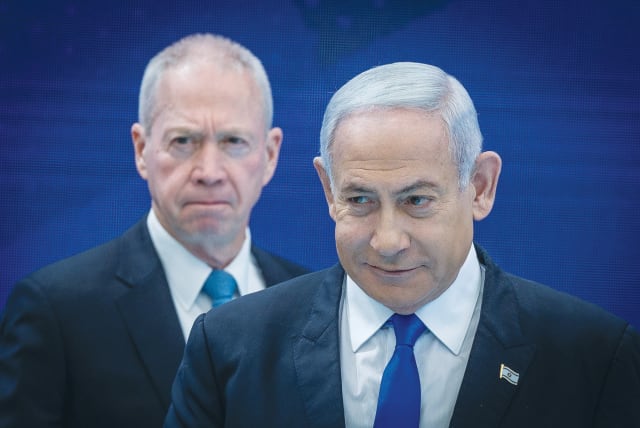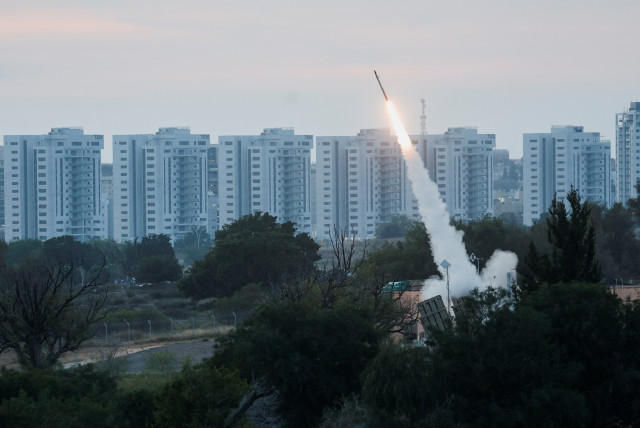Time for Israel to think strategically about Gaza - opinion

What is next for Israel and the Gaza Strip? While there is no questioning the legitimacy of the operation, questions can be asked about its overall effectiveness.
Like everything in this country today, even the protection of Israeli lives becomes political fodder.
On Tuesday morning when Israelis woke up to news that the IDF had eliminated three top Islamic Jihad commanders in the Gaza Strip, some people were happy to hear that the government had finally decided to retaliate for the launching of over 100 rockets the week before. Others decided to change the name of the operation from Shield and Arrow to “Itamar’s ladder,” a reference to National Security Minister Itamar Ben-Gvir, who had suspended his party’s participation in coalition voting over frustration with what he had deemed a weak response to the earlier rocket fire.
It was a lesson in just how deep some Israelis and specifically, political analysts have sunk. One hundred rockets are fired into Israeli cities and that is not enough of a justification for a response. The only reason, for these people, must be political.
This is, of course, ludicrous but it shows the way the discourse in this country has deteriorated over the last few years, caused by a mix of distrust in the government, frustration with the feeling that the country is stuck due to the fight over judicial reform, and the general mudslinging that remains after five elections over the last four years.
This does not mean that the operation does not come with some political benefit. On the one hand, Netanyahu showed – as can be expected from someone with the most diplomatic and security experience in government – that the waiting period between the rocket attack last week and the targeting of the Islamic Jihad terrorists on Tuesday was a strategic move.

The prime minister had approved the operation before the weekend and the IDF waited for an operational window of opportunity. That took a few more days.
What the operation also did, was provide Netanyahu with a much-needed break from the last four months – since the government was formed – which only saw him putting out fires and mostly trying to find a way to walk back his justice minister’s far-reaching judicial reform. This week he was what a prime minister is meant to be – someone taking the initiative and working to restore national security.
He was working in partnership with Defense Minister Yoav Gallant, the man he had planned to fire just a few weeks ago, and was sharing the stage for a joint press statement with IDF Chief of Staff Lt.-Gen. Herzi Halevi and Shin Bet chief Ronen Bar.
IT WAS a far cry from the way some of his Likud ministers had spoken just a few weeks ago about IDF officers. This week, when pilots from the Air Force’s 69th Squadron – who fly the vaunted F-15I fighter jet – bombed terrorist targets in Gaza, they were no longer told they need to “go to hell,” or referred to as “narcissistic cowards” and “puss that needs to be removed” – all names they had been called two months ago after some of the unit’s reservists said they would be skipping a day of reserve duty in protest of the continued legislation of the coalition’s judicial reform.
Thankfully, that is no longer the case.
Nevertheless, serious questions remain and when this operation is over – there is a good chance that it will be finished by the time you read this – there are two main issues Israelis and our government will need to confront.
The first, more immediate question, is what happens now? What does the operation mean for the judicial reform and the talks that have been taking place under the auspices of President Herzog? Does the fact that millions of Israelis had to race to bomb shelters mean anything to the people who are trying to revolutionize Israeli democracy? Does the participation in the fighting of reservists –who just weeks ago were called traitors – change anything?
The same question can be posed to the protesters: This operation will ultimately end in a ceasefire which will see Israel and Islamic Jihad stop shooting. Will the protesters stop protesting as the “ceasefire” talks at the President’s Residence continue, or will they keep fighting to bring down Netanyahu’s coalition?
What's next for Israel and Gaza?
And then there is the larger strategic question – what is next for Israel and the Gaza Strip? While there is no questioning the legitimacy of the operation, questions can be asked about its overall effectiveness. It was just nine months ago when Israel launched a similar operation (Breaking Dawn), also against Islamic Jihad, also after something happening in the West Bank used by Islamic Jihad to escalate the situation, and also including the targeted killing of top terrorist operatives.
Back then and after the operation ended, the IDF and the government claimed that Israel’s deterrence had been restored, and that the goals of the operation had been achieved. And while that might have been true at the time, nine months later whatever deterrence was achieved had clearly been lost. Now, the IDF and the government will again claim success and a restoration of deterrence which will only last until the next round.
IS THERE another way? Hard to know, but maybe it is worth trying to find out. The success in keeping Hamas out of the fray (as of Thursday afternoon) is partially due to an understanding by the group that as the sovereign ruler over Gaza, it will be held responsible. Not just for the physical damage to infrastructure, but also to the economy and the closure of crossings to the nearly 20,000 Gazans who work inside Israel.
In addition, when looking back at the 18 years since the Israeli unilateral withdrawal from Gaza in the summer of 2005, there have been seven large-scale operations, an average of one every two and a half years.
There was Summer Rains in 2006, Cast Lead in 2009, Pillar of Defense in 2012, Protective Edge in 2014, Black Belt in 2019, Guardian of the Walls in 2021, Breaking Dawn in 2022 and now Shield and Arrow.
Each operation had its cause and objective, but fundamentally and substantively, they were not that different from the one that came before or the one that came after. If we just change the names of the IDF generals, the defense minister and the top Islamic Jihad commanders, the stories are pretty much the same.
Can this change? That is not certain. There is no question that the foundation of this violence is the same as it has been for the last 100 years – a desire to kill Jews and weaken Israel. Yes, sometimes it is that simple.
It is important to remember that Israel is not to blame for the situation in Gaza – that is on Hamas and Islamic Jihad which prefer to spend their money on more rockets and missiles than on the quality of life of their people. But that does not mean that we should accept the reality of the last 18 years.
We owe it to ourselves, to our children and to the people of Gaza to try and come up with an alternative. Can a shift in the paradigm be found? Can economic benefits change the calculation? Maybe not, but now – as the countdown to the next operation begins – it might be the right time to try.
The writer is the immediate past editor-in-chief of The Jerusalem Post.
